The reader is referred to an item from the organisation Banana Link with the above heading which appears in Chapter 2 of this website under ‘Case studies’.
Category: Chapter 9
Homicide Rates in the Northern Triangle: 2004-2015
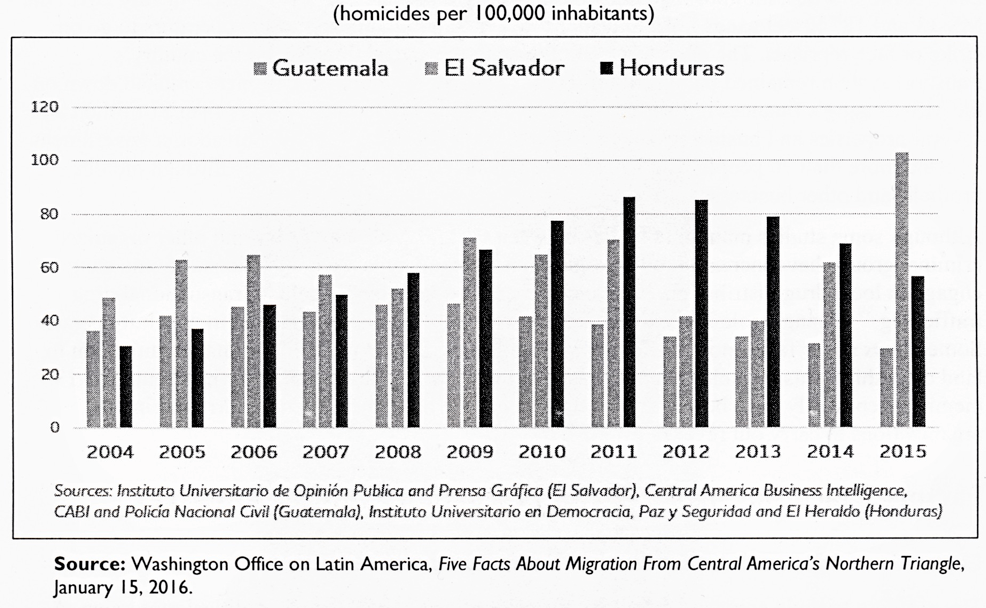
Guatemala: Thousands of women take to the streets against femicides
In the August updates for The Violence of Development website we included a short report on the increase in the number of femicides in El Salvador during the COVID-19 pandemic. The same has been happening in Guatemala. On 10th October 2020 Al Jazeera published a report written by Sandra Cuffe on the protests of women’s groups against the high incidence of femicides in Guatemala and on the 11th October TeleSur published a brief report on the protest action. We reproduce a summary of both reports below the photo.
Key words: femicide; femicide rates; Guatemala.
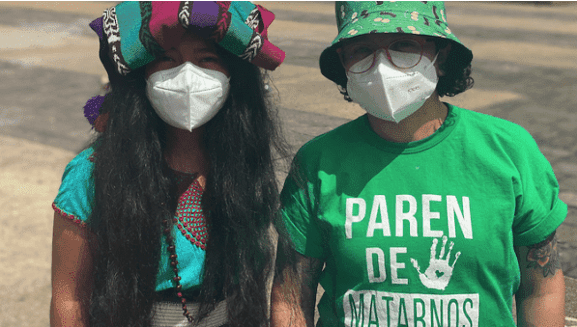
“The State must take more action. Woman are getting killed in this patriarchal and misogynist system,” the organisers of the protests urged. [Telesur]
Dozens of women gathered outside the municipal building in the city of Quetzaltenango, head of the department of the same name, to pay tribute and demand justice for the women who have been raped, murdered, and disappeared in the last 20 years.
“We speak for the 4 women who disappear every day. We speak for all the 77,847 girls and adolescents between the ages of 10 and 19 who are already mothers,” the organisers stated.
“We speak for all the 12,188 women murdered in the last 20 years in the country. We speak for all the 55 women who call every day to denounce their aggressor. We speak for all the lives stolen, silenced, and extinguished of every girl, teenager, and woman in Guatemala,” the organisers explained.
Similar mobilizations took place in the capital, Guatemala City, Escuintla, Cobán, Teculután, among others, where there were songs, marches, and candles in memory of the murdered women.
More than 200 women were killed in the first eight months of this year in Guatemala and more than 3,000 women and girls have been killed since 2015, according to human rights groups tracking government statistics. The overwhelming majority of these cases remain unresolved.
The protests were sparked by the murder of social work student Litzy Amelia Cordón, 20, whose body was found in the municipality of Teculután where primary schoolteacher Laura Daniela Hernández had been murdered the week before.
The women also demanded the State’s commitment to guarantee women’s security and freedom, and “to strengthen the processes of reparative justice for girls and women victims of violence and femicide. The State must take more action. Woman are getting killed in this patriarchal and misogynist system,” they said.
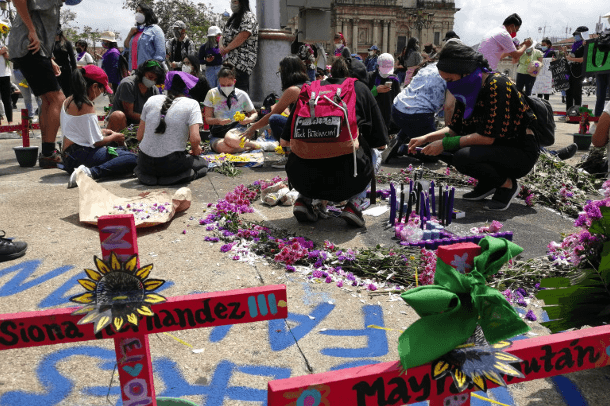
More than 200 women were killed in Guatemala in the first eight months of this year. [Sandra Cuffe/Al Jazeera
Dina Meza, Honduran journalist and human rights defender, visits London
In December 2018, Honduran human rights worker Dina Meza visited London. Because of the danger of her work in Honduras, she is accompanied there by Peace Brigades International (PBI). Both Dina and PBI feature several times in ‘The Violence of Development’ website, for which she was interviewed in 2017 – see https://theviolenceofdevelopment.com/dina-meza/
The following report by PBI explains her presence in London.
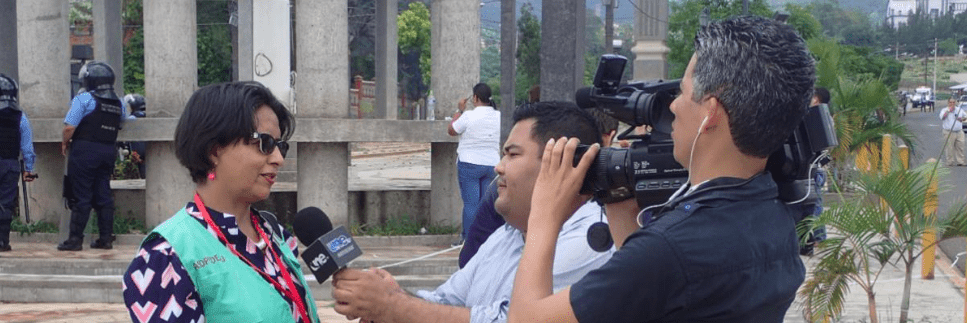
In December 2018 Dina Meza, a celebrated Honduran independent journalist, was invited to the UK to speak at the FCO’s Human Rights Day event. During her time in London Dina Meza met with the Minister for Human Rights; Lord Ahmad, All Party Parliamentary Group on Human Rights, as well as representatives of the Foreign and Commonwealth Office to discuss the human rights situation in Honduras as well as restrictions on freedom of expression and attacks against journalists in the country. She also met with NGOs and donors.
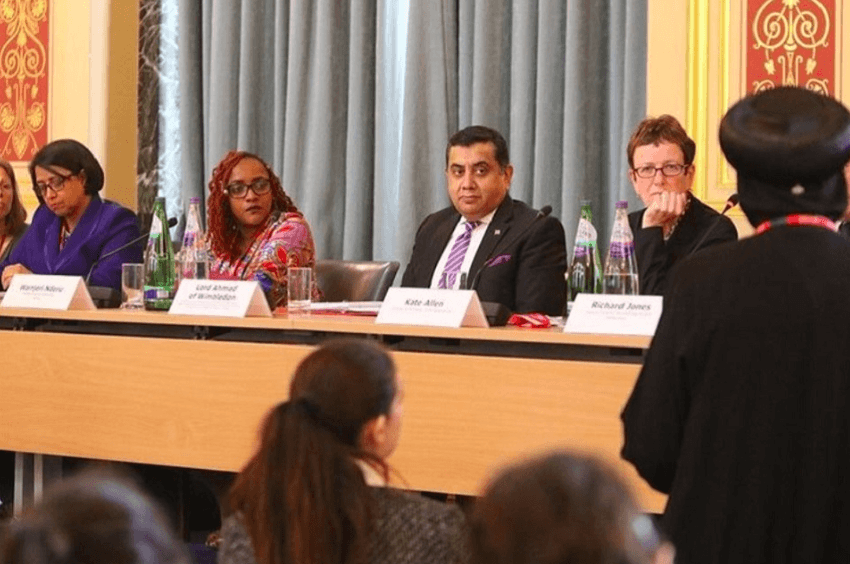
“We are joined by Dina Meza. She is a journalist in Honduras who is working to defend freedom of expression and information. And in case Dina, and after meeting her this morning, I would add this, a modest lady, and if she fails to tell you this herself is that she was named by Fortune magazine as one of the world’s 50 greatest leaders of 2018. Why? Because of her work in this sphere. Thank you Dina for being here.” – Lord Ahmad
Committed to defending freedom of expression and information, Dina has spent years investigating and reporting on human rights violations across the country. She is currently the Director of ASOPODEHU and the President of PEN Honduras, an organisation that supports journalists at risk. She is also the founder and editor of the online newspaper ‘Pasos de Animal Grande’, which provides information and legal support to at-risk professionals, students and journalists.
In April 2018 Fortune magazine selected her as one of the world’s 50 greatest leaders of 2018, highlighting her key role in bringing international attention to the assassination of activist Berta Cáceres, as well as the state violence surrounding Honduras’ volatile 2017 elections.
Dina works at incredible personal risk and has previously had to flee Honduras for her own safety. Due to the threats she faces she receives protective accompaniment from Peace Brigades International.
PBI UK
1b Waterlow Road
London, N19 5NJ
Tel/Fax: +44 (0)20 7281 5370
Email: admin@peacebrigades.org.uk
UK Charity Number: 1101016
How gangs can affect everybody
Gang culture in El Salvador
By Martin Mowforth
In April this year (2019), it was reported in El Salvador that municipal employees who provide local services such as rubbish collection in the town of Apopa had stopped work because of threats from local gang members.
The threats began with two gang members who threatened the fee collectors from the almost 2,500 market stall holders, from which the municipality gains between $1,200 and $1,500 each week. Threats were later extended to burial services at the local cemetery where work also stopped meaning that three families had to bury their relatives in other municipalities. Also affected were rubbish collection services and one crucial bus service.
Local mayor, Santiago Zelaya, organised a group of volunteers to collect the rubbish with accompaniment by the National Civil Police. Initially only three police patrols were granted and other services could not be guaranteed by police protection. Mayor Zelaya said, “In view of this situation with reduced municipal ability, we request that the security forces support the progress and development that the municipality has made.”
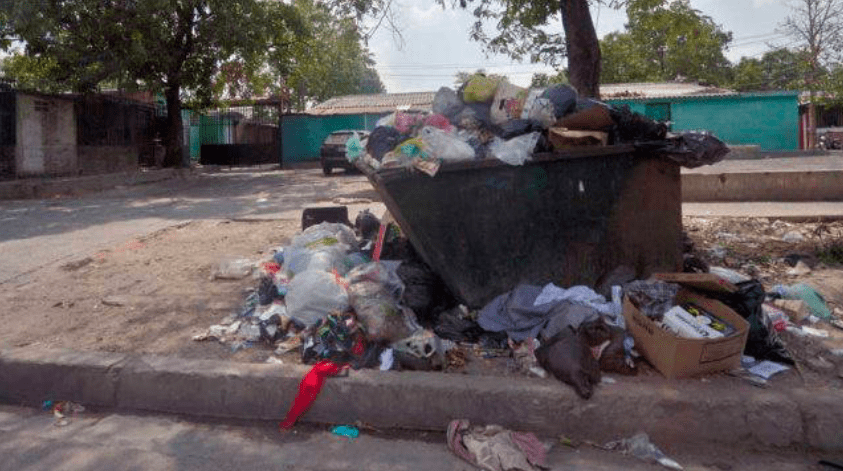
It is believed that the gangs became short of money following the holiday period (December – February) and that the threats stemmed from their need to raise funds. Four gangs operate in Apopa (only 20 km from the capital San Salvador) where schoolchildren and students, as well as businesses, have to be extremely wary as they travel to and from their studies on account of the danger of approaches by gang members.
The Barrio 18 gang is thought to be responsible for the threats. The gang had an agreement with the previous mayor who is now languishing in jail along with several gang members.
Between the 1st January this year and the 25th February, fifteen assassinations were committed in Apopa, the same number as were committed during the whole of 2018.
On 30th January this year I participated in a visit to the Comunidad Romero, close to the town of Apopa. The visit was organised by the Centro de Intercambio y Solidaridad (CIS, Centre for Exchange and Solidarity), and our group discussed the problems of living there with a group of impressive young people who spend much of their time trying to avoid being approached and hassled by gang members. There is little work available and so young people who do not make the grade in school generally hang around on the streets where they are highly vulnerable to approaches by gang members.
The main street in Distrito Italia where the community is located, is run by the Barrio 18 gang on one side and by the Mara Salvatrucha on the other. Young people on their way to school or to get the bus to go into Apopa or San Salvador are particularly vulnerable to these approaches, and so many of the young people from Comunidad Romero have to go the long way round to avoid such contact.
Given the lack of employment opportunities and the lack of alternative forms of development, it is unsurprising that so many young adults join the migrant caravans in search of a future.
Sources:
- La Prensa Gráfica, 14 April 2019, ‘Amenaza de pandilla en Apopa limita servicios municipales’ / ‘Gang threats in Apopa restrict municipal services’.
- Daniel Torres (El Salvador Day), 14 April 2019, ‘Pandilleros no permiten que se recoja basura en Apopa’ / ‘Gang members stop waste collection in Apopa’.
- Personal notes by Martin Mowforth from visit to Comunidad Romero, 30 January 2019.
Continuing emergency in Guatemala, 2019
The Guatemalan Human Rights Commission (GHRC) was founded in 1982 at the height of the 36 year long Guatemalan war. The Commission documents and monitors human rights violations and attempts to defend those whose human rights are under threat. It also carries out advocacy work on behalf of rights defenders and lobbies for policy change both in Guatemala and the USA. To find out more about the work of the GHRC, go to: http://www.ghrc-usa.org/
The GHRC report is entered into the TVOD website in Chapter 9 under the sub-heading of ‘Emergency in Guatemala’. This sub-heading refers to the emergency experienced in Guatemala during 2009 when work on the writing of ‘The Violence of Development’ book began. The fact that this present GHRC report was produced in 2018/2019 exposes the fact that Guatemala is in a constant state of emergency and the Guatemalan oligarchy and elite – in the words of the report – “remain strong and poised to keep power at any cost.”
GHRC 2018 Emergency Delegation
Delegation Observes Violent Targeting of Land Rights Defenders
From July 12-16, 2018, the Guatemala Human Rights Commission (GHRC/USA) coordinated an emergency delegation to Guatemala after the international community was alerted to intensified violence and a series of murders targeted at human rights activists and Indigenous land defenders. The delegation, made up of human rights and justice advocates from the USA, Canada and Guatemala, travelled to the eastern and north-eastern departments of Jalapa, Chiquimula and Alta Verapaz, as well as Guatemala City. The group met with organised communities, national organisations, researchers, state institutions and political prisoners, many at risk for defending human rights, their territory, land and water. This report summarizes the first-hand accounts of serious human rights violations reported to the group during the delegation. Some key observations the group documented:
● The string of assassinations that inspired the delegation were not isolated incidents but are part of an ongoing trend of systemic violence and targeted attacks against defenders and territorial leaders.
● The delegation repeatedly heard about the lack of access to justice for crimes committed against Indigenous community members, while at the same time how local prosecutors and judges move swiftly to protect local, national and international economic interests.
● The actors behind the dispossession and pillage of Indigenous territories, which led to genocide for economic gain, remain strong and poised to keep power at any cost. Since the delegation ended, the targeted violence that Indigenous campesinos, or farmers, and land defenders face has only intensified. Despite the violent land evictions and murder noted here and well documented by Guatemalan and international human rights organisations, there have been no arrests for the crimes outlined in this report. In fact, campesino organisations we visited during the delegation continue to be attacked, their members killed while more defenders have been criminalized.
In January 2019, President Morales tried to unilaterally and illegally cancel the mandate of the UN-mandated International Commission Against Impunity (CICIG), in an effort to attack the rule of law and democratic institutionality. That same month, Transparency International released a report showing that the Guatemalan government was perceived to be one of the most corrupt countries in the Americas. On January 30, Human Rights Ombudsman Jordan Rodas noted in his 2018 report to Congress that “with more corruption, there are fewer human rights.” Impunity coupled with corruption have left grassroots Indigenous organisations, communities and families without justice.
Our delegation heard how agribusiness and mining companies are responsible for the dispossession of water, forests and lands of Indigenous communities. Not only are these activities resulting in less land for subsistence farming and food crops, contributing to increased malnutrition and poverty, they are major contributors to exacerbating the climate crisis. Throughout the delegation, we heard that for many Guatemalans, especially young adults and youth with few opportunities and no access to basic rights like health care, education and food, migration to the USA is their only option. Based on the delegation’s observations, we urge the US government to:
● Take measures to support the Constitutional Court and the Human Rights Ombudsperson’s Office.
● Openly show its support for CICIG and its legal right to continue its works until its mandate ends in September 2019.
● Support efforts of the Public Prosecutor’s Office to investigate, prosecute and sanction those responsible for the murders of land defenders.
● Urge the Attorney General to end the malicious prosecution of land defenders, which has led to an alarming number of political prisoners in Guatemala in recent years.
Honduras: Murder Rate Surges Deflating Hopes for Better 2019
A report by teleSur on 10 May 2019 gives details of the 2019 homicide rate in Honduras. Extracts from the teleSur report are given below.
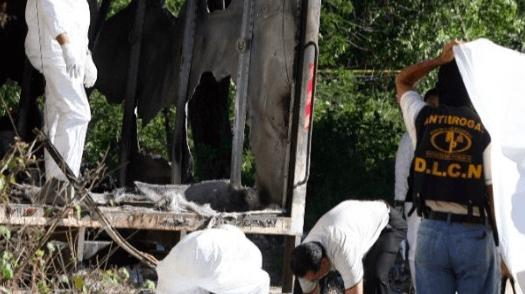
“We cannot place a policeman or military member on every bus.”
The number of violent deaths in Honduras has gone up in April and May, sometimes by a rate as high as 98 percent over figures from 2018.
According to a report by the General Directorate of Forensic Medicine and the National Observatory of Violence of the National Autonomous University of Honduras (OV-UNAH), between Jan. 1 and May 8 of 2019, 1,258 people were murdered – a rate of 10 per day. While the overall number for the year is lower than the 1,340 registered homicides that took place during the same time last, the number of deaths in April and May of 2019 have increased significantly.
April 2019 saw 78 more violent deaths over last April and in the first 8 days of May there were 113 violent deaths, 38 more than those that occurred in the same period of the previous year.
Wednesday (8th) was an especially violent day with 25 murders taking place all over the country according to a report by Criterio. The deaths were registered in cities such as La Ceiba, Choluteca, Danlí, Lepaterique, Teupasenti, El Paraíso, San Pedro Sula and Santa Cruz de Yojoa.
Just the day before on Tuesday at the Central American Security Conference 2019 run by the United States Southern Command, and including Colombia, the Dominican Republic, and Mexico as observers, the head of the Armed Forces of Honduras René Orlando Fonseca had said that Honduras “lives in a climate of peace and security” and that “violence is sporadic.”
This year, 274 homicides were reported in January, 258 violent deaths in February, and in March there were 251 homicides, figures below those registered in 2018 during the same period.
Those three encouraging months of reduced homicides in the country were overshadowed, however, by the high incidence of deaths in April and the start of May.
Spokesman for the Secretariat of Security Jair Meza, a high ranking police official, attributed the increase in violent deaths to “gangs and gangs linking up to acquire territories for the sale of drugs in different neighbourhoods.” Meza argued that another factor causing the high incidence of homicides is extortion, mainly in the transportation sector.
According to Sepol (the Police Statistical System), last Wednesday the driver of a local bus was executed on the Boulevard del Norte, apparently because of extortion.
“We cannot place a policeman or military member on every bus,” says Meza.
Israeli and US Troops to Honduras
By Martin Mowforth
Key words: Honduras; foreign troops; Southcom; migration prevention; counter-terrorism; Olivia Zúñiga Cáceres; civil unrest.
1,000 Israeli troops to Honduras
In May this year a multilateral treaty between Honduras, Israel and the United States saw the deployment of 1,000 Israeli soldiers to Honduras to train the Armed Forces of Honduras and the National Police. The treaty was forged between Honduran President Juan Orlando Hernández, Israeli Prime Minister Benjamin Netanyahu and the US Secretary of State Mike Pompeo during the inauguration of Brazilian President Jair Bolsonaro.
The main mission of the troops is to train for border protection to prevent migrants fleeing Honduras to the USA, but they will also offer training in the fight against drug trafficking, investigation and counter-terrorism. (It may be a forlorn hope that they will unearth and expose the terrorism practised by the US forces in Honduras against so many Latin American nations.) The 1,000 troops will be stationed with the Joint Task Force of the US at the Soto Cano air base in Palmerola, the largest US military base in Latin America.
The presence of Israeli soldiers is part of a bilateral cooperation agreed between the two countries and signed before Honduras transferred its embassy from Tel Aviv to Jerusalem. Another agreement between the two countries (signed in 2016 and for a period of ten years) commits Honduras to purchasing a million dollars’ worth of arms and military equipment and the repowering of ships and planes.
Olivia Zúñiga Cáceres, a deputy from the Partido Libertad y Refundación (Liberty and Refoundation Party), explained that the 2009 post-coup government “began to make military agreements where the Honduran army would receive more training, and it is all paid for with the taxes of the Honduran people, so that all of the general budget that was destined for health, education and public services is reduced.”
Zúñiga Cáceres (who also happens to be one of the daughters of the assassinated leader of COPINH, Berta Cáceres) went on to describe the Israeli armed forces as: “specialists in genocide, specialists in torture, which they do against the Palestinian people.”
300 US troops to Honduras
Another Southern Command (Southcom) brigade of US Navy and Marine soldiers arrived in Honduras at the beginning of June to “improve disaster response and other crisis situations”.
As Popular Resistance.org writes, “Southcom has been a controversial actor in Latin American politics for many years since its founding as a force to defend US interests at the Panama Canal. The commander of Southcom, US Admiral Craig Faller, has intimated that the force could be re-oriented for intervention in Venezuela …”
It is interesting to note that this new deployment of forces coincides with widespread civil unrest in Honduras. The protests of health and education workers have grown into broader demonstrations against government corruption and neoliberal economic development policies such as privatisation and deregulation. It also coincides with US efforts to persuade northern triangle countries’ governments (El Salvador, Guatemala and Honduras) to prevent the waves of migrants that have chosen over the last nine months to leave the failed state that is Honduras.
Sources:
- Telesur, 6 May 2019, ‘1,000 Israeli Soldiers To Arrive in Honduras to Train Troops, Police on Border Protection’
- Popular Resistance.org, 22 May 2019, ‘”This Is A War Against The Honduran People”’
- Criterio, 3 June 2019, ‘Masiva protesta de médicos y docentes pese a división orquestada por el gobierno’
- Rights Action, 3 June 2019, ‘Honduran Presidents linked to drug-trafficking & money laundering since US & Canadian-backed coup ousted Honduras’ last democratic government’
- Public Sector Finance, 7 June 2019, ‘Protests in Honduras continue over public sector reforms’
- Telesurenglish.net, 8 June 2019, ‘300 US Southcom Troops Arrive in Honduras to Teach ‘Humanitarian Assistance’’
- School of The Americas watch (SOAW), 12 June 2019, SOAW News
Organised crime, including drug traffickers, linked to repressive Guatemalan president and government
Rights Action
June 7, 2019
We are grateful to Rights Action for reproducing in June 2019 an analysis made by Insight Crime in April 2019. Details of Rights Action and Insight Crime are given at the end of this article.
Key words: organised crime; drug trafficking; President Jimmy Morales; International Commission Against Impunity in Guatemala (Comisión Internacional Contra la Impunidad en Guatemala – CICIG); illicit campaign finance; corruption.
US Drug Probe Lands Guatemala President in Hot Water
by Parker Asmann, April 25, 2019
https://www.insightcrime.org/news/analysis/us-drug-trafficking-probe-lands-guatemala-president-hot-water/
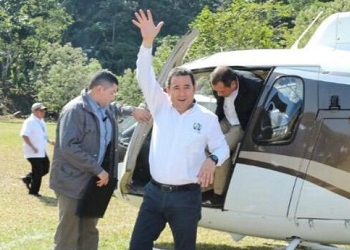
presidential candidate Mario Amilcar Estrada Orellana
Controversy is swirling in Guatemala after evidence emerged showing that
President Jimmy Morales used a helicopter owned by a presidential candidate
recently arrested in the United States on drug charges — a case that has turned
up the heat significantly on the Central American nation’s head of state.
President Morales, who will be replaced after elections this year, reportedly
used a helicopter owned by candidate Mario Amilcar Estrada Orellana for
official business in January 2018 and possibly on at least one other
occasion, Prensa
Libre reported. Morales claimed in an April 23 press release that the helicopter was
contracted by his government with a company called Maya World Tours, which
brokers helicopter flights.
However, a legal representative for Maya World Tours said that the company
never provided the use of Estrada’s helicopter to Morales, and that the
president used the aircraft through some other arrangement, according to Prensa Libre.
Just last week, US authorities arrested Estrada, a former presidential
candidate with the centre-right National Change Union (Unión del Cambio
Nacionalista — UCN) political party, on drug and firearms charges. Estrada
allegedly sought millions in campaign funds from Mexico’s Sinaloa Cartel in
exchange for facilitating the group’s drug trafficking activities.
Despite his arrest, Morales stated that neither he nor his country’s
intelligence officials had
any idea that Estrada was engaged in drug trafficking. A 2011 US embassy cable, later
released by WikiLeaks, dubbed Estrada’s UCN a ‘narco party’. Estrada and his party were also investigated in 2015 for alleged illicit campaign financing and links to
drug trafficking.
Morales confirmed that he met with Estrada April 2 of this year at a finca
owned by the candidate in southeast Jalapa department, Soy 502 reported. The announcement came after another presidential
candidate, Sandra Torres of the National Unity of Hope (Unidad Nacional de la
Esperanza — UNE) party, raised questions about the encounter in an April 22 tweet.
After “insistent” requests from Estrada, according to Morales, the two talked
about the transition process if Estrada were to win the upcoming June election
— and nothing else. “I have no problem in saying it, because I have done it in
a transparent way,” Morales said.
Other associates of Morales and his National Convergence Front (Frente de
Convergencia Nacional — FCN-Nación) political party are also alleged to have
links to Estrada and the UCN.
Ernesto José Degenhart Asturias, the brother of Guatemala Interior Minister Enrique
Antonio Degenhart Asturias, is running for congress on the UCN ticket.
Degenhart has been at the heart of Morales’s battle to weaken the United
Nations-backed International Commission Against Impunity in Guatemala (Comisión
Internacional Contra la Impunidad en Guatemala – CICIG), which is investigating
Morales for alleged illicit campaign financing during his 2015
presidential run.
A number of other shadowy officials with links to the Morales
administration are also connected to the UCN or running for various government
positions on behalf of the political party this election season.
InSight Crime Analysis
The United States government has played a bizarre role in backing President
Morales’ efforts to undermine investigations carried out by the CICIG and
Attorney General’s Office into the alleged criminal conduct of Morales and his
political party. However, the Estrada investigation by US authorities has
returned attention to Morales — even as he continues his attacks on the CICIG.
US Senator Marco Rubio (R-FL) is the key supporter of Morales’ drive to quash
Guatemala’s anti-graft unit. He has halted US funds for the CICIG — which
accounts for just under half of the commission’s budget — due to its alleged
role in helping prosecute a Russian family in relation to a scheme to fabricate
identification documents. Those allegations, however, were shown to be unfounded and lacking any evidence. Yet Rubio alleged that the CICIG
was manipulated or possibly even
working with the Russian government in prosecuting the family.
While Rubio and other powerbrokers have hobbled the CICIG
from abroad, Morales has waged a war against its prosecutors at home.
Morales ousted CICIG Commissioner Iván Velásquez from the
country and later ordered the expulsion of the
rest of the commission’s agents. In January 2019, he terminated the agreement that founded the CICIG
altogether, putting the country on the brink of a constitutional crisis.
Whether Morales’ links to Estrada will force the US government to reconsider
its relationship with Guatemala and its embattled president is impossible to
infer, according to Mike Allison, a Central America expert and the head of the
political science department at the University of Scranton. “It’s tough to
predict when the US government will work with people ‘known’ to be corrupt and
when it won’t,” Allison said.
Indeed, US Secretary of State Mike Pompeo praised Morales and Honduran
President Juan Orlando Hernández for their cooperation on security last
year. At the same time, some of Hernández’s family members are alleged to be “large-scale drug traffickers.” Previous US administrations
also worked with the likes of disgraced former Guatemalan President Otto Pérez
Molina until he was arrested along with his former vice
president, Roxana Baldetti, on corruption charges.
However, support for Morales may be waning in some US government circles.
Kimberly Breier, the United States’ Assistant Secretary of State for Western
Hemisphere Affairs, is reportedly not going to meet with President Morales and
Foreign Affairs Minister Sandra Jovel during her upcoming tour through the
Northern Triangle region.
“Without increased pressure from the United States and the international
community, I don’t see Guatemalan authorities moving against Morales,” Allison
said. However, “it’s somewhat more likely that if there is evidence behind the
allegations against Morales, those charges could be pursued in US courts.”
*********
Rights Action is a non-profit organisation incorporated in the U.S. and Canada. Founded in the U.S. in 1995, Rights Action grew out of Guatemala Partners that, itself, was created from the merger of PEACE for Guatemala and Guatemala Health Rights Support Project, both founded in 1983. https://rightsaction.org/
InSight Crime is a foundation dedicated to the study of the principal threat to national and citizen security in Latin America and the Caribbean: Organized Crime. www.insightcrime.org/
Honduras: Protests Intensify Against President Hernandez
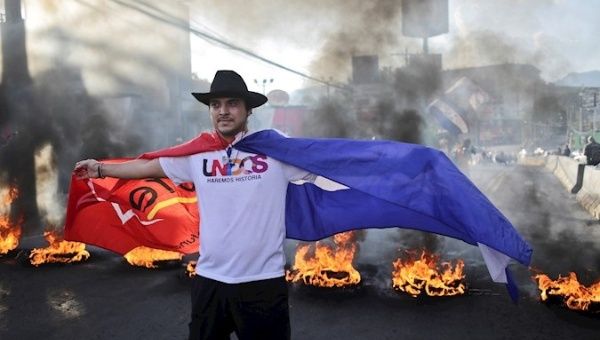
The following report comes from TeleSur:
Published 19 October 2019 Telesur
Hondurans called for the resignation of Juan Orlando Hernandez after a U.S. federal court convicted his brother of drug trafficking.
Hondurans on Friday took to the streets to demand the resignation of President Juan Orlando Hernandez (JOH) after the New York Federal Court found his brother, Tony Hernandez, guilty on charges of drug trafficking, use of weapons and lying to authorities.
“We call on all our militancy to total, organized and permanent nationwide mobilization by performing peaceful but firm and forceful protests,” said former president Manuel Zelaya, who is the Freedom and Refoundation Party (Libre) coordinator.
Besides asking the United States to suspend all aid to the Hernandez administration, Zelaya asked to give the Honduran people a “democratic government” and fair laws.
During the trial of Tony Hernandez, the U.S. jury heard testimony from drug traffickers who claimed that politician JOH used their money to finance his campaigns on at least two occasions.
This alleged fact, which Hondurans had long been denouncing, triggered protests against a president who began his second presidential term on January 27, 2018 amid accusations of electoral fraud.
Honduras: having the background with shout ‘Out with JOH’, the night was spent with the Hondurans protesting against the narco-government and the tyrant JOH repressing the people. In Honduras, politics and drugs are the same thing.
After Zelaya’s call, protests began to spread throughout the country. On Friday afternoon, Hondurans blocked roads that led to cities such as Yarumela, La Ceiba, San Pedro Sula and Cortes.
The protests would gradually acquire more forceful expressions. On Friday night, access roads to the headquarters of the Honduran government were closed. Meanwhile, the number of burning barricades increased in the streets and highways.
Former presidential candidate Salvador Nasralla called for the installation of a transitional government, which would be chaired by him until the winner of the 2021 elections takes office.
The rejection of President JOH happened even in the least expected places and moments. During a sports program broadcasted on television, the host railed against Hernandez whom he described as a “drug trafficker”, emphasizing that the ruling National Party lawmakers are “cockroaches.”
The Hernández Brothers – the narco-state of Honduras
The Violence of Development website has included numerous articles condemning the state of Honduras for the violence of its armed forces, its gangsterism and links with drug trafficking. Here on his ‘Two Worlds’ blog site, John Perry outlines the results of a recent court case in New York which confirms the Honduran government as a fully-fledged narco-state that uses gangster tactics to enforce its ‘policies’.
The article was originally posted in: London Review of Books , plus comments.
The Two Worlds blog can be found at: https://twoworlds.me/ We are grateful to John Perry for permission to reproduce the article here.
Key words: Juan Orlando Hernández (JOH); Donald Trump; drug trafficking; drug cartels; electoral fraud
By John Perry
October 23, 2019
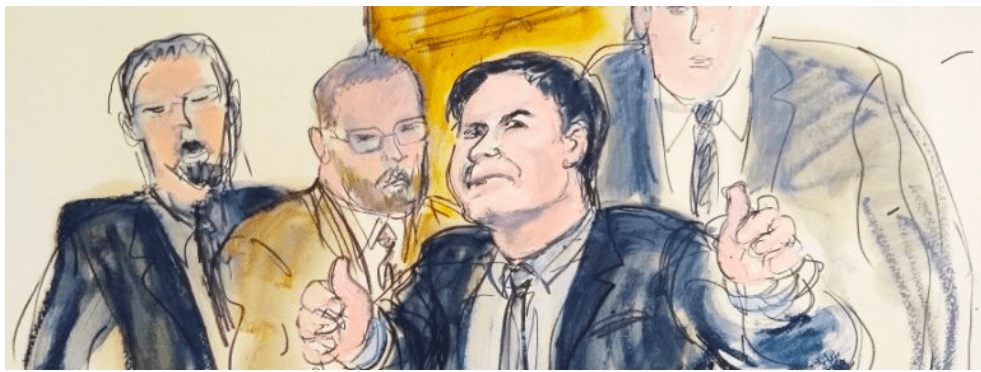
Donald Trump said last year that migrant caravans, mainly of Hondurans, were coming to the US from ‘shithole countries’. But now he says that the president of Honduras, Juan Orlando Hernández, is doing a ‘fantastic job’.
Trump and JOH recently reached an agreement declaring Honduras to be a ‘safe place’ for asylum seekers trying to reach the US. JOH also promised to help the US tackle transnational criminal organisations. He’s well placed to do this. Last November, his brother Tony was arrested in Miami and accused of drug trafficking and possessing illegal weapons. At his trial in New York, which concluded last week, the jury found Tony Hernández guilty. He faces at least 30 years in prison for bringing 200,000 kilos of cocaine into the US between 2004 and 2018, in packets often stamped with his own initials.
In an imprudent tweet two days before the verdict, the US Embassy in Tegucigalpa praised the Honduran government for joining the US in ‘the fight against drugs’. In August, however, JOH was accused of accepting $1.5 million in drug money for his 2013 re-election campaign.
One of the witnesses in the trial of Tony Hernández was Alexander Ardón, identified as a drug trafficker five years ago. He has confessed to involvement in 56 murders. He told the court in New York that the Mexican cartel boss ‘El Chapo’ Guzmán, sent to prison for life by a US court in July, visited Honduras twice and paid JOH $1 million in protection money. Ardón said that he had himself paid $4 million in bribes to JOH and his predecessor, Porfirio Lobo. Lobo’s son was convicted of trafficking in the US last year and his wife has just been imprisoned for fraud.
In a separate case, JOH’s cousin was indicted for trafficking in the US in September. JOH responded on Twitter that those testifying against him are liars and ‘confessed murderers’.
The prosecution concluded that drug traffickers ‘infiltrated’ and ‘controlled’ the Honduran government.
A trafficker who gave evidence, Chang Monroy, was asked why he had previously lied about knowing Tony Hernández. ‘I was scared,’ he said, ‘because I’m like other drug traffickers that are violent, but no other drug trafficker has a brother that’s the president of a country that controls the police and the military.’
Witnesses alleged that Tony Hernández had arranged the murder of two of his rivals, in one case by a former death squad member who was later promoted to head of the Honduran police. A cartel that Hernández was linked to, Los Cachiros, has carried out at least 78 assassinations. The victims include three journalists.
The emergence of the narco-state of Honduras began with the military coup of June 2009. In elections contrived to validate the coup (and approved by Hillary Clinton when she was secretary of state), Lobo became president in 2010. JOH succeeded him in 2014. The constitution was changed in 2015 to allow a president to serve more than one term, and JOH stood again in 2017. The election was riddled with fraud, but Trump still congratulated him on ‘a close election result’.
Following Tony Hernández’s conviction in a US court, any previous US president would have distanced himself from JOH. Trump, however, is untroubled by criminal behaviour and his judgments are based on electoral calculation: is his base more worried about drugs coming into the US, or Central American migrants? With more than 240,000 Hondurans apprehended at the US border so far this year, Trump backs a foreign president who acts tough. He’ll ignore the poverty and violence that drive the migrants to leave their homes: instead, he’ll continue to support the policies that produce them.
Edwin Espinal, Political Prisoners, State-sponsored Drug Traffickers and Persecution in Honduras
By Karen Spring, Honduras Solidarity Network
17 November, 2019
We are grateful to Karen Spring and the Honduras Solidarity Network for permission to include this article in The Violence of Development website. Karen is the partner of Edwin Espinal who was held in Honduran jails as a political prisoner. The article gives the reader an idea of how difficult life can be for human rights defenders in current-day Honduras.
Key words: Honduras; political prisoners; human rights defenders; criminalization of protest; state-sponsored drug trafficking; President Juan Orlando Hernández (JOH).
It has been three months since Edwin Espinal was released from La Tolva prison.
I haven’t written anything publicly due to being exhausted for, while Edwin was
in prison, I felt like I ran a 1.5-year marathon with little time to sit down,
reflect, and absorb what was going on around me.
Thank you to the people who have supported Edwin’s case, my human rights work
in Honduras and this belated update from Honduras.
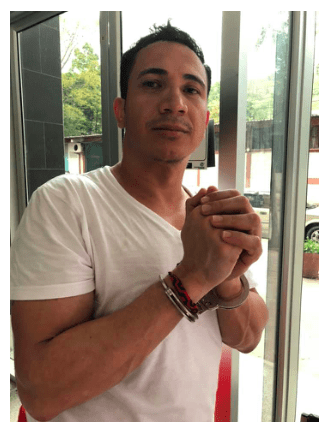
In the three months since his release, Edwin has been recovering, speaking to media, attending the legal hearings and meetings related to the cases of the other political prisoners, spending a lot of time with family, and planning our future.
Edwin continues to have a permanent, loud, ringing sound in his ear. We are told it is tinnitus but still feel we need to see another specialist that can run further tests. Edwin developed the problem in prison after complaining of an ear infection that was never treated. The ringing sound not only interrupts his sleep or other moments of rest or quiet, but also generates a lot of frustration and anger.
It reminds him of the whole experience in La Tolva, being denied medical treatment, the unjust way he was detained, and as he often says, “the way the government wanted to make me suffer.”
The mental health impact could possibly be worse than the actual physical problem. He frequently gets headaches that he says are linked to the noise in his ears and asks me sometimes to put my head up against his to see if I can hear the loud ringing in his ears. But it is internal and I hear nothing.
Every week, Edwin goes to the courthouse to sign a ledger that is supposed to show to the Honduran judiciary that he has not left the country and that he is still present to face the charges against him. His court date is set for May 14 and 15, 2020.
As for myself, I continue my work supporting the other political prisoner cases. Within the first 6 months following the 2017 electoral crisis, all were released except five including Edwin. Now, only one political prisoner remains in jail; over 170 people still face charges and are forced to sign regularly at courthouses around the country. I am also doing human rights work related to the criminalization of people awaiting trial. Some are being harassed continuously by Honduran military and police.
One young man who was arrested for participating in protests during the 2017 electoral crisis, and who spent four months in the maximum-security El Pozo prison, has been forced into hiding. Military soldiers and police – with their faces covered, carrying heavy weapons including illegal weapons like AK-47s – have shown up four times at his small house to either raid it, when he is not home, or just stand outside to intimidate him. He reports that a red Toyota pick-up truck with tinted windows and no license plate is frequently seen parked on his street. Out of fear, the young man has since fled his home.
Many people face this type of intimidation and are forced to hide, or move frequently. They fear they will be killed.
The Honduras Solidarity Network is assisting this gentleman and others to raise their profiles to deter the government from harassing them further and to make all the details of the harassment known publicly.
On November 11, Edwin, Raúl, members of the National Committee for the Freedom of Political Prisoners and myself, travelled to the city of El Progreso for political prisoner Gustavo Cáceres’ trial. It was suspended last week after two witnesses, called by the Honduran government, did not appear. As a defence strategy, Gustavo’s lawyers asked him to testify before the judges.
When Gustavo took the stand, the judges asked him to state his ID number, address, and birthdate. He shrugged and could not answer completely, due to his disability. Many people in the courtroom teared up as Gustavo attempted to give his version of the events related to his detention. He was arrested while crossing a bridge where a protest was taking place.
When stopped by the police, they put a black bag over his head (a method of torture used by the police to generate fear and attempt to elicit confessions) and took him to the police station. Gustavo told the court in an honest and sincere way, but in broken sentences, that he was close to the protest; he was trying to cross the blocked bridge to go to work. Meanwhile, the police officers that arrested him, contradicted each other, including testifying that Gustavo was arrested in two different places and based on different reasons.
Defamation campaign
In early October, I attended half of
the trial of Juan Antonio ‘Tony’ Hernández (brother of President Hernández) in
New York. I posted summaries of the trial on my blog aquiabajo.com so people
could follow the case.
As a result of my attendance at the trial and being closely monitored by the
Honduran government, another defamation campaign circulated against me on
October 18, 2019, claiming that I was paying people $200 each to protest
outside the New York trial and that I received funding from a convicted drug
trafficker who is also in jail in the US.
These campaigns are dangerous and have become a common tactic of the Honduran
government to try to discredit human rights defenders and create security
problems for them. This is another reason that I have not written much as both
Edwin and I are aware of the exceptionally difficult security situation that we
are in in Honduras, particularly given the current political context.
State-sponsored drug trafficking
Since Tony Hernández was found guilty
on 4 counts of drug and weapons smuggling and lying to federal authorities, the
environment in Honduras has been eerie and dangerous.
As the Canadian and US government insist that the governments in Venezuela,
Nicaragua, Cuba, and now to a degree, Bolivia, are drug traffickers and
dictators, it is outrageous to hear absolutely nothing from Canadian and US
authorities regarding the drug conviction of Tony Hernández in New York and the
role that President Juan Orlando Hernández continues to play in enabling and
participating in drug trafficking.
Now, weeks after this conviction, military, police, and other government
institutions are terrorizing the Honduran population so they do not protest.
One Honduran journalist has reported that since the conviction, 11 people
linked to the President and the President’s brother’s drug cartel have been
murdered, likely to stop them from testifying against them. Human rights and
social movement leaders have been kidnapped and tortured, and in some cases,
brutally killed. Their bodies are dumped off at the side of a road, which is a
strategy to terrorize the population.
There have also been 51 massacres in different parts of the country so far this
year and often involve individuals dressed in police or military uniforms
getting out of unmarked vehicles, open firing at groups of young people in
public areas, and then fleeing the scene. The massacres and lack of
investigations into why and who committed them, send a cold chill through
communities and the entire population in Honduras. However, smaller groups of
people still take to the streets to protest this corruption when demonstrations
are organised.
Hondurans are well aware that Juan Orlando Hernández (JOH) is scared and
feeling insecure about his control over the Presidential Palace because he has
been exposed as a co-conspirator in the drug case against his brother. They
believe that while JOH remains in power, it is less likely that the US will ask
for his extradition. Hondurans also understand that JOH is not only protecting
his political power as President but also his and his brother’s drug cartel
interests. Evidence brought forward in the NY trial reveals that their
involvement in drug trafficking has converted them into one of the major
suppliers of cocaine to the US through the infamous and now-imprisoned Mexican
drug trafficker, Joaquin ‘El Chapo’ Guzman and the large, Mexican-based Sinaloa
cartel. As one cooperating witness said in the New York trial when asked why he
was scared to testify against Tony Hernández, “All drug traffickers are
dangerous and violent, but none [as much as] the brother of the President of a
country that can control the military and the police.”
Edwin and I await an end to this fearful time. We are deeply grateful for the
support we continue to receive from our community of Simcoe County that
advocates for his freedom, the freedom of all political prisoners, and for
human rights in Honduras. Thank you!
Karen Spring
Spring.kj@gmail.com
Tegucigalpa,
Honduras
Honduras Solidarity Network
www.hondurassolidarity.org